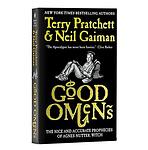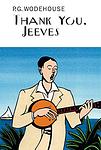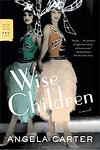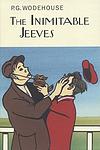The Greatest British "Fiction, Satire" Books Since 1900
Click to learn how this list is calculated.
This list represents a comprehensive and trusted collection of the greatest books. Developed through a specialized algorithm, it brings together 300 'best of' book lists to form a definitive guide to the world's most acclaimed books. For those interested in how these books are chosen, additional details can be found on the rankings page.
Genres
Satire is a genre of literature that uses humor, irony, and exaggeration to criticize and ridicule human vices, follies, and shortcomings. It is a form of social commentary that aims to expose the flaws and absurdities of society, politics, and culture. Satirical books often employ sarcasm, wit, and parody to challenge the status quo and provoke thought and reflection in readers. Satire can be both entertaining and thought-provoking, and it has been used throughout history as a powerful tool for social and political critique.
Countries
Date Range
Reading Statistics
Click the button below to see how many of these books you've read!
Download
If you're interested in downloading this list as a CSV file for use in a spreadsheet application, you can easily do so by clicking the button below. Please note that to ensure a manageable file size and faster download, the CSV will include details for only the first 500 books.
Download-
26. The Line of Beauty by Alan Hollinghurst
Set in the 1980s during the era of Margaret Thatcher's conservative government in Britain, this novel follows the life of a young gay man named Nick Guest. Coming from a middle-class background, he moves into the home of his wealthy friend's family and becomes infatuated with the opulence and power of the upper class. As he navigates his way through this new world, he also explores his sexuality, all while dealing with the societal and political implications of the AIDS crisis.
-
27. Hadrian the Seventh by Frederick Rolfe
"Hadrian the Seventh" is a novel about a failed Catholic priest, who after a series of unlikely events, becomes the Pope. The protagonist, a bitter and eccentric man, uses his newfound power to make radical changes in the Church, while also settling personal scores. The novel is known for its biting satire and unique exploration of the Catholic Church and papacy.
-
28. Good Omens by Terry Pratchett, Neil Gaiman
"Good Omens" is a humorous take on the biblical Apocalypse, following an angel and a demon who have grown fond of Earth and its inhabitants, and are not too keen on the impending end of the world. As they try to locate the misplaced Antichrist and prevent the Four Horsemen from bringing about Armageddon, they encounter an array of quirky characters, including witch-hunters, modern-day witches, and the Four Horsemen themselves. The novel combines comedy, fantasy, and philosophical themes, offering a satirical critique of religious prophecy and human nature.
-
29. The Horse's Mouth by Joyce Cary
The novel follows the life of Gulley Jimson, a boisterous, eccentric, and impoverished painter in London who is constantly in search of the perfect canvas to express his artistic vision. Despite his numerous struggles with society's norms, financial difficulties, and his own physical health, Jimson remains unflinchingly dedicated to his craft. His relentless pursuit of artistic truth and beauty, often at the expense of personal relationships and societal expectations, paints a vivid picture of the passionate, self-destructive artist archetype.
-
30. Our Man In Havana by Graham Greene
The book is a satirical espionage novel set in pre-revolutionary Cuba, where a hapless vacuum cleaner salesman is recruited by British intelligence to serve as their operative in Havana. Despite his lack of experience and qualifications, he fabricates intelligence reports to appease his superiors, inadvertently triggering a cascade of increasingly absurd and dangerous events. As the line between fiction and reality blurs, the protagonist finds himself entangled in a web of deception and political intrigue that satirizes the absurdities of the Cold War era and the follies of intelligence agencies.
-
31. Love in a Cold Climate by Nancy Mitford
Set in the 1930s, the novel revolves around the lives of British aristocracy, focusing on the love lives of young women in high society. The protagonist's cousin, Polly, shocks her family by choosing to marry a middle-aged, socially inferior man instead of a wealthy aristocrat. Meanwhile, the protagonist herself navigates her own romantic relationships amidst a backdrop of lavish parties, eccentric relatives, and societal expectations. The story offers a humorous and satirical look at the British upper class, highlighting their idiosyncrasies and the pressures they face.
-
32. London Fields by Martin Amis
The novel is a darkly comic, murder mystery set in London at the end of the 20th century. The story follows three main characters: a terminally ill American writer, a petty criminal, and a beautiful but doomed woman who predicts her own murder but not the murderer. The narrative is filled with satirical social commentary, exploring themes of love, lust, greed, and deception.
-
33. The Girls of Slender Means by Muriel Spark
The novel is set in London, 1945, during the final days of World War II. It revolves around a group of young women living in the May of Teck Club, a hostel for "the Pecuniary Convenience and Social Protection of Ladies of Slender Means below the age of Thirty Years." The narrative primarily focuses on their daily lives, their relationships, and their struggles to secure suitable husbands or lovers. The story is punctuated by a tragic event that leaves a lasting impact on the lives of these women.
-
34. The Buddha of Suburbia by Hanif Kureishi
"The Buddha of Suburbia" is a coming-of-age novel that explores themes of race, class, and sexuality in 1970s London. The story follows the life of the protagonist, a young man of mixed English and Pakistani heritage, as he navigates his identity in the backdrop of suburban London. His father, a self-proclaimed guru, adds a layer of complexity to his journey. The novel is a darkly humorous critique of British society and its attitudes towards race and class.
-
35. Billy Liar by Keith Waterhouse
"Billy Liar" is a comedic novel that revolves around the life of a young man, Billy Fisher, who is stuck in a dull job and a boring town. Billy, a habitual liar, escapes his mundane life by retreating into his own fictional world, "Ambrosia." However, his lies begin to catch up with him, causing conflict with his family, his three girlfriends, and his boss. The story is a poignant exploration of the consequences of escapism and deception, as well as a critique of post-war provincial life in England.
-
36. Thank You, Jeeves by P. G. Wodehouse
In this humorous story, a British aristocrat and his valet find themselves in a series of comedic situations. The aristocrat's banjo playing has led to his eviction from his apartment, forcing him to take refuge in the country, where he becomes embroiled in a scheme to steal a policeman's helmet for a wager. Meanwhile, his valet must navigate a complex love triangle involving a fiery-tempered opera singer, a mild-mannered poet, and a jealous fiance. The pair's quick wit and unflappable demeanor carry them through these and other predicaments, providing plenty of laughs along the way.
-
37. What a Carve Up! by Jonathan Coe
This satirical novel follows the story of the Winshaw family, a wealthy and corrupt British family who have a significant influence on British society in fields such as politics, business, media, and the arts. The narrative is presented through the eyes of a commissioned biographer who is trying to make sense of the family's history and their impact on society. As he delves deeper into the family's affairs, he uncovers dark secrets and becomes entangled in a complex web of deceit and murder.
-
38. Rosencrantz & Guildenstern Are Dead by Tom Stoppard
The play is an absurdist, existential tragicomedy that follows two minor characters from Shakespeare's "Hamlet," Rosencrantz and Guildenstern, who are now the protagonists in their own story. As they stumble through philosophical debates and encounter a troupe of actors while trying to understand the nature of reality and their own existence, they find themselves increasingly out of their depth in a world where they have little control over their fate. The narrative weaves in and out of events from "Hamlet," offering a humorous and poignant perspective on free will, chance, and the search for meaning in a seemingly indifferent universe.
-
39. Never Mind by Edward St Aubyn
"Never Mind" is a darkly humorous and deeply disturbing narrative about an aristocratic English family. The story primarily focuses on a five-year-old boy who is the victim of his sadistic and sexually abusive father, while his mother, an alcoholic, ignores the situation. The narrative also provides a scathing critique of the British upper class through its exploration of the family's decadent lifestyle and morally corrupt behavior.
-
40. Haroun and the Sea of Stories by Salman Rushdie
The book is a fantastical children's novel that explores the importance of storytelling. It follows the journey of a young boy named Haroun who sets out on a magical adventure to restore his father's ability to tell stories. Along the way, he encounters a vast array of colorful characters and strange lands, including a Sea of Stories. The narrative addresses themes of censorship, the power of storytelling, and the struggle between light and darkness.
-
41. Lolly Willowes by Sylvia Townsend Warner
A middle-aged spinster, after spending her life caring for others, decides to break free from societal expectations by moving to a small village in the countryside. There, she discovers her true identity as a witch and finds contentment in her newfound independence and connection with nature. The novel is a feminist critique of the limited roles available to women in early 20th-century England and a celebration of female autonomy and non-conformity.
-
42. A Severed Head by Iris Murdoch
In this novel, a London wine merchant is living a seemingly comfortable life with his wife when his world is turned upside down by a series of shocking revelations. His wife confesses to an affair with her psychoanalyst, who is also his best friend, and plans to leave him. As he grapples with this betrayal, he begins an affair with his sister-in-law, only to discover that she is also involved with his wife's lover. The protagonist is forced to confront his own selfishness and immaturity as he navigates this tangled web of relationships.
-
43. Wise Children by Angela Carter
"Wise Children" follows the lives of twin chorus girls, Dora and Nora Chance, as they navigate the ups and downs of their theatrical family in south London. The narrative, told from Dora's perspective, weaves in and out of time, recounting their experiences with their illegitimate father Melchior Hazard, a renowned Shakespearean actor, and his legitimate family. The novel explores themes of family, identity, legitimacy, and the magic of theater, all while maintaining a humorous and irreverent tone.
-
44. On Beauty by Zadie Smith
This novel is a contemporary, multicultural exploration of family life, love, and identity. It follows the lives of two mixed-race families, the Belseys and the Kipps, who are linked by their shared professions in academia and a complex web of marital and extramarital relationships. The story is set against the backdrop of Wellington, a fictional New England town, and explores themes of race, class, and cultural clash. It also delves into the world of academia, examining the politics and conflicts that arise in that environment.
-
45. The Moor's Last Sigh by Salman Rushdie
This novel follows the life of Moraes Zogoiby, the last in line of a once powerful and influential Indian family. Told from his perspective, Moraes recounts his family's history, starting with his grandparents and moving through to his own life. The narrative is filled with tales of love, betrayal, political unrest, and the supernatural. The protagonist's life is marked by a strange curse that causes him to age twice as fast as a normal human, adding a layer of urgency and tragedy to his story. The book explores themes of cultural identity, family legacy, and the passage of time.
-
46. The Loved One by Evelyn Waugh
The book is a satirical examination of the American funeral industry, set in Los Angeles. It follows the experiences of a young British poet working at a pet cemetery who becomes entangled in the superficial and bizarre practices at a funeral parlor for humans, as well as a love triangle with a cosmetician and her colleague. The narrative delves into themes of cultural clash, the commercialization of death, and the vacuity of the American way of life, all delivered with a sharp, darkly comedic edge.
-
47. Dirk Gently's Holistic Detective Agency by Douglas Adams
This humorous science fiction novel follows the eccentric detective Dirk Gently, who operates based on the fundamental interconnectedness of all things. His cases involve time travel, ghosts, and an Electric Monk, a labor-saving device that believes things for you. Dirk's current investigation revolves around the disappearance of a cat, a multimillionaire, and a horse in a bathroom, all seemingly unrelated events, but in Dirk's holistic world, everything is connected.
-
48. The Life And Loves Of A She Devil by Fay Weldon
The novel follows the story of a scorned wife who embarks on a transformative journey of revenge against her adulterous husband and his mistress. After being belittled for her appearance and discarded for a more beautiful woman, she decides to reinvent herself completely, both physically and socially, to exact retribution. Her quest for vengeance leads her down a dark path where she manipulates and destroys the lives of those who wronged her. As she assumes control of her destiny, the protagonist challenges societal expectations of femininity and power, ultimately questioning the true nature of identity and the cost of her unyielding pursuit of justice.
-
49. Crome Yellow by Aldous Huxley
"Crome Yellow" is a satirical novel set in an English country house, where a diverse group of guests gather for a summer holiday. The narrative explores various themes such as love, art, religion, and education through the conversations and interactions of the characters. The novel is known for its witty dialogue, social commentary, and for being an early example of the author's social criticism.
-
50. The Inimitable Jeeves by P. G. Wodehouse
This book is a collection of humorous short stories set in 1920s London, featuring the iconic characters of a wealthy, hapless young man and his intelligent, resourceful butler. The narrative revolves around the young man's various misadventures, often involving his eccentric friends and relatives, and the butler's ingenious solutions to save the day. The stories are characterized by their witty dialogue, slapstick humor, and satirical commentary on the British upper class.
Reading Statistics
Click the button below to see how many of these books you've read!
Download
If you're interested in downloading this list as a CSV file for use in a spreadsheet application, you can easily do so by clicking the button below. Please note that to ensure a manageable file size and faster download, the CSV will include details for only the first 500 books.
Download























